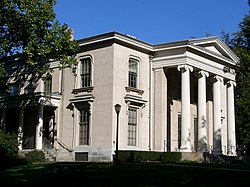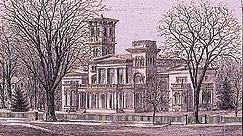Hillhouse Avenue
Hillhouse Avenue Historic District | |
 Skinner House, Town and Davis, 1832. | |
| Location | Bounded by Sachem, Temple, Trumbull, and Prospect Sts., Whitney and Hillhouse Aves. & RR tracks, New Haven, Connecticut |
|---|---|
| Coordinates | 41°18′52.2″N 72°55′23.6″W / 41.314500°N 72.923222°W |
| Area | 18 acres (7.3 ha) |
| Built | 1792 |
| Architect | Town and Davis, Henry Austin, et al. |
| Architectural style | Victorian |
| NRHP reference No. | 85002507[1] |
| Added to NRHP | September 13, 1985 |
Hillhouse Avenue is a street in New Haven, Connecticut, famous for its many nineteenth century mansions, including the president's house at Yale University. Both Charles Dickens and Mark Twain have described it as "the most beautiful street in America."[2] Much of the avenue is included in the Hillhouse Avenue Historic District, which extends to include houses on adjacent streets.[3]
History
[edit]
The avenue is named for James Hillhouse (1754–1832) (and his son James Abraham Hillhouse, 1789–1841), innovator in land use in New Haven, who began the program of tree planting that gave New Haven its nickname, The Elm City, and who laid out the Trumbull Plan for Yale College and the Grove Street Cemetery.
Hillhouse Avenue was initially called Temple Avenue, and was staked out, 150 feet (46 m) wide, by Hillhouse employee, and later Yale president, Jeremiah Day, in 1792. The avenue ran from the Green at Temple Street to a hilltop location where James Abraham Hillhouse built the family mansion, Highwood (later called Sachem's Wood), in 1828. The houses along the wide avenue were set back with room for trees creating a park-like effect. The elms which once shaded the street were lost to Dutch elm disease, but mature oak trees have largely taken their place.
The avenue was privately owned until 1862. Because of the nature of the street, its lots, and its orientation to the nine-square-grid of New Haven (the nation's first planned city), Hillhouse Avenue is sometimes considered to be the first suburb in the United States.
The Hillhouse mansion was razed in 1942 in accordance with a directive in the will of James Abraham Hillhouse's daughter, Isaphene. In time, Hillhouse Avenue came to be divided into an upper, residential area, and a lower portion for public buildings and the Farmington Canal. It is now just two blocks long, running from Grove to Sachem. The upper portion of the avenue, along with the adjacent blocks (and the Dana House), was designated the Hillhouse Avenue Historic District on the National Register of Historic Places in 1985.[1]
Buildings
[edit]Yale now owns all of the properties on Hillhouse Avenue except for St. Mary's Church and its parish house. Many of the mansions of the upper area have been converted for use by the economics department, Cowles Foundation, School of Management, and other academic departments, and have been completely restored. Lower Hillhouse primarily includes university buildings, a number of them formerly part of the Sheffield Scientific School. There are several houses designed by architects Ithiel Town, Henry Austin and Alexander Jackson Davis. The area at the end of the avenue where Hillhouse's mansion stood is now part of the Science Hill section of Yale's campus.
Notable buildings on Hillhouse Avenue that are included in the historic district are:
- James Dwight Dana House, designed by Henry Austin, built 1845-1848. Home to the Yale Statistics Department for many years, and listed as a U.S. National Historic Landmark
- Mary Prichard House, 1836. This Greek revival design by Alexander Jackson Davis includes a two-story Corinthian porch with white columns. It is also known as the Provost's House and has been used to house Yale administration.[4]
- Henry Farnam House, Russell Sturgis, 1871. Redesigned with Victorian features removed in 1934. It has been the home of Yale's presidents since 1937.
- John Pitkin Norton House (Steinbach Hall, Yale Astronomy Department,[5] formerly Yale School of Management), 1849. Tuscan/Italian Villa on Hillhouse Avenue designed by Henry Austin.
- Charles Henry Farnam House, J. Cleaveland Cady, 1884. Queen Anne style.
- Pelitiah Perit (Horchow Hall, Yale School of Management), Sidney Mason Stone, 1859. Renaissance revival/Tuscan.
- Henry F. English House, 1892. Classical revival mansion, designed by Bruce Price. Home of the Yale University Office of Undergraduate Admissions.
- Graves-Dwight House, 1862. This villa is now used by the Yale Anthropology Department.
- Apthorp House (Evans Hall, Yale Astronomy Department, formerly Yale School of Management), Town and Davis, 1836 (with extensive subsequent remodeling).
- Skinner House (Yale Astronomy Department, formerly Yale International Center of Finance), Town and Davis, 1832. Landmark Greek Revival.
- Graves-Gilman House (now 37 Hillhouse), 1866. Victorian Italian Villa. Home of Sheffield professor, Daniel Coit Gilman. Converted into apartments for married Yale students (1946–1957). George H. W. Bush lived here while he was a student and his son lived here until the age of two.[6] Now used by the Yale Department of Economics.
- Abigail Whelpey House, 1826. The oldest house standing on Hillhouse. This Federal structure was altered in the 1860s with a mansard roof and dormer windows by Noah Porter, later President of Yale. The house, now known as Allwin Hall, has served as a residence for Yale administrators.[7]

Buildings on lower Hillhouse Avenue, outside of the historic district, include:
- Cloister Hall (now Warner House), 1888. Brownstone building originally served the Book and Snake fraternity of the Sheffield School.
- Kirtland Hall, Dunham Laboratory, Mason Laboratory, Leet Oliver Memorial Hall. Yale University buildings originally part of the Sheffield Scientific School.
- St. Mary's Church and parish house.
- Sheffield-Town Mansion. Ithiel Town, 1836. Additions for Joseph Earl Sheffield by Henry Austin in 1859. Razed in 1957.
- Yale University Collection of Musical Instruments, 1895. Romanesque structure built originally for the Alpha Delta Phi fraternity.
Significant properties not on Hillhouse Avenue, but included in the historic district, include:[3]
- Russell Henry Chittenden House, at 83 Trumbull Street, listed as a National Historic Landmark.
- Wolf's Head, built in 1883, designed by McKim, Mead & White, Richardsonian Romanesque with stepped end gables, former home of Wolf's Head Society.
- William Lyon Phelps House, 1908–1909, at 110 Whitney Avenue, Colonial Revival
- a second William Lyon Phelps House, 1914, at 114 Whitney Avenue, designed by J. Frederick Kelly, "one of New Haven's finest Colonial Revival-style structures"[3]: 14
Images
[edit]-
John Norton House
-
Mary Prichard House
-
Graves-Gillman House
-
Graves-Dwight House
-
Peletiah Perit House
-
Henry English House
-
George Fisher House
-
Elizabeth Apthorp House
-
Henry Farnam House
-
Abigail Whelpey House
-
St. Mary's Church
See also
[edit]References
[edit]- ^ a b "National Register Information System". National Register of Historic Places. National Park Service. July 9, 2010.
- ^ "Hillhouse Avenue, City of New Haven". Archived from the original on September 1, 2012. Retrieved April 27, 2008.
- ^ a b c Mary McCahon; J. Paul Loether; John Herzan (December 17, 1984). "National Register of Historic Places Inventory-Nomination: Hillhouse Avenue Historic District". National Park Service. and Accompanying 22 photos, from 1979 and 1985
- ^ Prichard House, Yale Facilities[permanent dead link]
- ^ "Astronomy Department moves to Hillhouse Mansions | Department of Astronomy".
- ^ Ahles, Dick (December 24, 2000). "Bush's Birthplace? It's Deep in the Heart of . . . New Haven". The New York Times. ISSN 0362-4331. Retrieved May 15, 2023.
- ^ Allwin Hall, Yale Facilities[permanent dead link]
Sources
[edit]- Holden, Reuben A., Yale: A Pictorial History, Yale University Press, New Haven, 1967.
- Pinnell, Patrick L., Yale University: The Campus Guide, Princeton Architectural Press, New York, 1999.
- Kelley, Brooks Mather, New Haven Heritage, New Haven Preservation Trust, 1974.
- Hillhouse Avenue Historic District, New Haven Preservation Trust
External links
[edit]- Hillhouse Avenue Historic District Archived August 3, 2010, at the Wayback Machine, New Haven Preservation Trust website (text adapted from NRHP nomination, plus gallery of 11 photos)
- National Register of Historic Places in New Haven, Connecticut
- Yale University
- Historic districts in New Haven, Connecticut
- Tourist attractions in New Haven County, Connecticut
- Houses in New Haven County, Connecticut
- Streets in Connecticut
- Geography of New Haven, Connecticut
- Historic districts on the National Register of Historic Places in Connecticut














